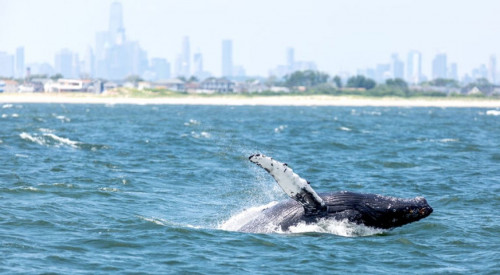Originally Posted on July 13, 2016
This weekend the Times carried a wonderful article by Ricard Schiffman. It starts with this:
“In less distance out to sea than the average New Yorker’s commute home,” he said, “there is likely a whale singing at this very moment.”
The article is full of insight into the life (and predicament) of whales, action, action heroes; and contains a great many resources all working on behalf of the Environment. Highly recommended:
http://www.nytimes.com/2016/07/10/nyregion/the-great-new-york-whale-census.html
Surprisingly, at least seven species of whales travel through the waters off NYC. Including "the blue whale, and one of the most endangered creatures on earth".
"As to why so many whales are passing through New York’s waters — and which of them live in the metropolitan area year-round — even whale experts are at something of a loss."
To get the sense of purpose and adventure, I refer you to Mr Schiffman's article, it's a really good read. The article contains a vivid, brief history of whaling in the New York region going all the way back to 1640, and the terrible toll it took on the whales as that industry became increasingly mechanized.
Here is why this whale listening and census project is so exciting to us, at Earth Initiative:
"Critically, scientists will be tracking how close whales venture to New York’s crowded shipping lanes, and they hope to send out alerts to mariners, through the Coast Guard and the Port Authority of New York and New Jersey, urging them to slow down when the animals are nearby."
I find myself very encouraged to read of the coordination, dedication, technolgy and resolve that is being brought to this effort. Tip o' the cap.
Here, I want to catalog the amazing set of Organizations and People who have come together to conduct the largest-ever survey of New York’s whales.
The Wildlife Conservation Society
The parent organization for the New York Aquarium in Coney Island, see below
The Woods Hole Oceanagraphic Institute
Mark Baumgartner, a marine ecologist at Woods Hole and a director of the New York whale project. Mark expressed this project goal re gill nets and other "fixed gear" used by fisherman and a peril to whales, is to use the information generated to: "designate areas where we don’t allow fishermen to set fixed gear". Amen
EOM Offshore - who worked in tandem w WHOI to moor a listening buoy into the waters off Fire Island. "It will monitor whale calls within the New York Bight, the wedge of continental shelf that lies between the South Shore of Long Island and the New Jersey coast."
There is a WHOI website dedicated to tracking the project: Autonomous Real-time Marine Mammal Detections
New York Aquarium in Coney Island
Dr. Howard Rosenbaum, the director of the Ocean Giants program
International Whaling Commission
The IWC banned whaling in 1986, providing hope for the whales
Riverhead Foundation for Marine Research and Preservation
Kimberly Durham, their rescue program director, reports in the article that "2015 was the worst year yet for whale mortality in the area" - upping the urgency
National Marine Fisheries Service a service of NOAA, the National Oceanograpic and Atmospheric Association
The article notes that Boston has been listening for whales since 2008. Based on that data, "The National Marine Fisheries Service has mandated that ships slow to 10 knots in coastal areas frequented by whales to prevent collisions."
Alternative Marine Technologies
Robert Kunkel, the President of AMT, tells Mr Schiffman, for his article: it was in the interest of the shipping industry to comply. “Hitting a whale is creating a problem for the shipowner, too,” he said. “He has to see if he has propeller damage or hull damage.”
United Nations Environment Program
By now we are all aware of the problems that Ocean noise can pose to whales, who communicate with each sonically, over great distance. The UNEP issued a report, cited in Mr Schiffman's article that "Human-generated underwater noise doubled every 10 years during the last half of the 20th century"
Stunning right?
This revived my sympathy for the whales, made me a bit more hopeful for we humans. A lot to marvel at and admire above
#Climate #Whales #WHOI #WildlifeConservation #NYC #NYTimes FacebookTwitterLinkedInShare

